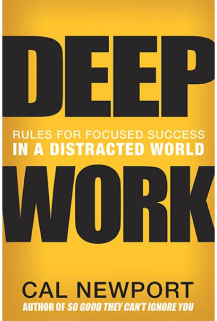Deep Work | Cal Newport
Part I: The Idea
Deep Work Is Valuable
- 3 types who thrived in the new economy: high-skilled workers/super stars/owners.
- How to thrive in the new economy: quickly master hard things & produce at elite level.
- Deep work & deliberate practice: intense concentration & feedbacks towards productivity.
Reasoning: myelin & attention residue & law of productivity. - Exception: Jack Dorsey’s case.
Deep Work Is Rare
Why hard works is rare:
- Deep work is hard and shallow work is easier.
- The metric black hole: hard to measure different knowledge work behavior's actual impact on the bottom line (outcome)
- "The Internet" technopoly culture that believes whatever the IT revolution provides are revolutionarily good.
Deep Work Is Meaningful
- Neurologically, as Winifred Gallagher discovered, our brain construct our worldview based on what we pay attention to. Deep work requires concentration and thus it both focuses your worldview to your deep endeavor and filters out those unavoidable unpleasant things. Shallow work, instead, have exactly the opposite effect.
- Psychologically, as Mihaly Csikszentmihalyi researched, going deep is a rewarding feeling since it's well suited to generate flow state.
- Philosophically, as Hubert Dreyfus wrote, craftsmanship (any pursuit that supports high-level of skill) cultivates the appreciation of the subtlety which is crucial for someone to find meaning in a post-Enlightenment world - a glimpse of sacred.
Part 2: The Rules
Rule #1 Work Deeply
By reading Part 1, you may have developed the attempts to bring more depth to your work. However, simply telling yourself that you will do it is not enough - human's will power is a limited resources and thus fighting the urge towards shallowness needs solidified philosophy & habits.
- Depth philosophy
- Monastic philosophy
Radically exclude yourself from correspondence and focus on the deep work. Suitable for those whose contribution to the world is discrete, clear, and individualized.
e.g. Donald Knuth & Neal Stephenson. - Bimodal philosophy
Shift between monastic mode and socially available mode during different periods (lasting from days to months).
e.g. Carl Jung & Adam Grant. - Rhythmic philosophy
Schedule deep works as a daily routine to boost the consistency. Use chain method (marking the completions of the routine on your calendar) as a stimuli.
e.g. Jerry Seinfeld & Brain Chappell. - Journalistic philosophy
Squeeze the spare time to conduct deep works. Be careful though, the constant context shifting may tires you faster.
e.g. Walter Isaacson.
- Monastic philosophy
- Strategies
- Ritualize
Ritualize the place you work, the time you work, the way you kick start your work, and the support you get for your work. The purpose is to help yourself committing to the work seriously.
One extreme of this advise is to make grand gestures, like lock yourself to a distant places/luxury hotel room to work. e.g. Bill Gates' Think Weeks. - 4DX framework
The 4DX framework is initially proposed for guiding business executive. The author found it very useful for deep work too:- Focus on the wildly important
Doing more means complete less. Only focus on the most important things. - Act on the lead measure
Instead on optimizing the lag measure, i.e. the final outcome interested, optimize the lead measure that leads to a satisfied outcome. - Keep a compelling scoreboard
- Create a cadence of accountability
For a organization, this means a form of meeting. For individuals, this can be implemented as the weekly review.
- Focus on the wildly important
- Be lazy after shutting down work
Idleness is vital for work performance since only during it you can restore your attention and energy. More over, your brain is still processing information unconsciously during idleness, which is a state shown to outperform deliberate thinking for the vague, conflicting, information demanding decision tasks.- Shutdown rituals
To ensure true relaxation after working, you need to log all your thoughts firing in your brain to a task/idea tracking system, to avoid the Zeigarnik effect.
- Shutdown rituals
- Deep works with collaborators
Serendipitous communication can boost creativity, but it can't replace deep work. You need to be able to shift from these two domains purposefully. In the most ideal cases, you can combined the benefits of the two - the white board effect, i.e. working together with a shared white board which push both of you into a deeper state.
- Ritualize
Rule #2 Embrace Boredom
The ability to concentrate intensely is a skill to be trained.
- Take breaks from distraction won't work, because your brain is distracted most of the time. Instead, we should take breaks from focus, to help your brain get used to the low-stimuli/high-value activities.
- Schedule internet block & offline block. The key is when you need Internet access during the offline block, you can reschedule an Internet block at least 5 min later (for the matter of brain training).
- Roosevelt dash
Set dashing DDL to force you to work with intense focus, like what Teddy Roosevelt did.
- Meditate productively
Think deeply on a well-defined problem when you are physically occupied by walking, running, etc. Bring your attention back whenever it wanders. It's beneficial to structure your deep thinking to 3 steps:- Review relevant variables
- Define specific next-step question
- Review and consolidate your gains
- Memorize a deck of cards
Human brains is not good at memorizing abstract information, but very good at remembering scenes. The memorization champions utilize this reality and engineer an approach for memorization, which is great for training your ability to focus - the ability the world-class mental athletes are actually training.- Memorizing 5 rooms, and for each room memorizing 10 objects. Add 2 extract objects to the list. Then training yourself to do mental walkthrough these rooms and objects in order.
- Associate the 52 cards with memorable persons.
- When memorizing a freshly shuffled cards, do the metal walkthrough and image the person associated with the cards interacting with the objects, one by one.
Rule #3 Quit Social Media
- On tool chosen
When deciding whether to use social media or not, as well as other tools in general, there are two mindsets: the any-benefit mindset selects whichever tool with some benefit, while the craftsman approach carefully calculates the opportunity costs and only select those provides more benefits than its costs.- The law of the vital few
The calculation of benefits and costs should be restricted to only considering its impact on a limited list of your main goals () and main key activities (). Only the most important activities should be included, since the allocation of attention is a zero-sum game.
- The law of the vital few
- Quit social media
Based on this mindset, for most people, quitting social could be a good choice, cuz usually you don't need social media to do your deep work and pursuit your grand goals. In fact, social media can fragment your attention severely since they are profitable products designed to be additive.- The feeling of having an group of audience is an illusion - in fact, most of them don't care that much. More over, the anxiety of not catching up is unnecessary. You can verify this by quitting social media for 30 days.
- Don't use Internet to entertain yourself cuz it could easily stuff your limited free time with digital crab. Offer yourself something deep and meaningful as an alternative.
Rule #4 Drain the Shallows
- Quantify the depth of every activity
It's hard to quantify the depth of a task. There's rarely a task that completely irrelevant to the end outcome; yet only a limited number of tasks has depth.
Luckily, a more clear metric exists: how many months of training it takes for a college graduate to learn how to do it.
E.g. editing academic paper is much deeper than attending progress meeting or composing stats slides. - Schedule every minute of your day: Time blocks
The purpose is not stick to the plan minute by minute, but instead let you thoughtfully arrange what you do next and maintain the balance between deep and shallow works. Introduce structure into your life is for facilitating depth.- Fixed schedule productivity
Setting hard limit on finish your work by 17:30 won't harm your productivity if you consider working proposal with (ruthless) caution and rejects shallow obligations - this may even be a motivation for you to do so and end up with more deep work time.
Noted that when refusing proposal, a clear break is the bset.
e.g. Professor "Tom" v.s. Prof. Radhika Nagpal.
- Fixed schedule productivity
- Become hard to reach
- Sender filters
Make people who send you email do more work. In your contact page, reset the senders' expectation and add more work to them like providing a Google Form to fill, etc. - Process centric approach in reply
Do more work when reply: compose a comprehensive review of motivation, status, availability, etc. to minimize the back-and-forth messages - to close the loop. - If the email doesn't worth it to respond, don't respond.
- Sender filters
- Ask your boos for a shallow budget
Have an conversation with your boss and convince him that paying you to do more deep work worth more. Your boss's words can then be leveraged to protect your from shallow obligations from your working environment - which may drain your working time if your adopt the traditional guilt-driven unconditional acceptance approach otherwise.

